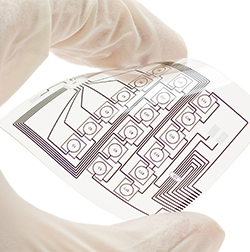
Enrique Gomez, Ralph Colby and Scott Milner are working to design the molecular structures of conducting polymers for applications in flexible electronics. The work is focused on predicting fundamental polymeric properties, such as the stiffness of the polymer chain and other physical and chemical properties. Image adapted from Macromolecules, 2014, 47, 6453.
Chemical engineers receive $1.2M to examine conjugated polymers for flexible electronics
8/30/2016
UNIVERSITY PARK, Pa. — The National Science Foundation (NSF) has awarded $1.2M in funding to three Penn State researchers for a proposal which aims to identify the key polymeric properties of conjugated polymers used to develop flexible electronics.
The research, led by Enrique Gomez, associate professor of chemical engineering, will lay the foundation in predicting the mechanical and conductive properties of the polymers from their chemical structure.
“The aim of this project is to accelerate the development of the next generation of conjugated polymers for flexible electronics,” said Gomez. “By developing computational tools and examining molecular design rules, we will be able to better predict the electrical conductivity and mechanical factors of polymers to advance the development of new materials to create flexible electronic devices.”
The flexible electronics industry is a growing field that encompasses a wide range of applications that include smartphones, watches, bendable displays, biomedical devices and wearable fabrics among many others. The industry offers vast societal potential and continues to grow in popularity, however, little remains known about the conjugated polymers that serve as their backbone.
Gomez, along with collaborators Scott Milner, William H. Joyce Chair Professor of Chemical Engineering, and Ralph Colby, professor of materials science and engineering and chemical engineering, will embark in a 3-year research program to examine the polymers’ physical and chemical properties and make predictions about how they will bend, stretch and conduct energy in flexible electronic applications.
Gomez and his research team will focus primarily on the synthesis of organic molecules characterization using X-ray scattering techniques and electron microscopy, as well as device fabrication and testing; the Colby group will examine mechanical and structural properties of polymers; and the Milner group will develop computational simulations to apply theory in novel ways. A key concept of the project is to promote close collaborations, including graduate students who will be co-advised by two of the PIs. Together, the researchers are hopeful that their findings will advance the design of conjugated polymers.
“What is different about this project is the emphasis placed on understanding fundamental polymer properties to develop new materials for flexible electronics,” said Gomez. “We believe that is really the key differentiator and it is sorely needed to make progress in the design of conjugated polymers for electronic applications.”
In addition to the proposed work, the researchers also plan to launch a new undergraduate research program under the grant with help from Penn State’s Leonhard Center for the Enhancement of Engineering Education. The program will provide students in STEM fields, specifically those enrolled at Commonwealth Campuses, with opportunities to become involved with computational work related to the project. The purpose of the program is to provide real-world research experiences to students who are not physically located at University Park. Individual students and small groups of students will learn and interact with key faculty through web-based seminar courses, remote mentoring opportunities and through several planned site visits.
“A unique attribute of this proposal is the educational component,” said Gomez. “We are very interested in broadening research participation among undergraduates and one of the things we hope to explore is the idea that computationally based research does not necessarily need to be completed at University Park. Penn State Commonwealth Campuses offer the ideal settings for us to begin expanding the breadth of our outreach.”




